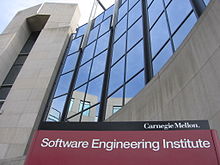Software Engineering Institute
 |
|
| Established | November 14, 1984 |
|---|---|
| Research type | Unclassified |
| Budget | US$584 million for 2011–2015 |
|
Field of research
|
Software engineering |
| Director | Paul D. Nielsen |
| Staff | 700 |
| Address | 4500 Fifth Avenue |
| Location |
Pittsburgh, Pennsylvania, United States 40°26′48″N 79°57′00″W / 40.4466°N 79.9500°WCoordinates: 40°26′48″N 79°57′00″W / 40.4466°N 79.9500°W |
|
Zip code
|
15213 |
| Affiliations | Department of Defense, Department of the Army |
|
Operating agency
|
Carnegie Mellon University |
| Website | www |
The Carnegie Mellon Software Engineering Institute (SEI) is a federally funded research and development center headquartered on the campus of Carnegie Mellon University in Pittsburgh, Pennsylvania, United States. The SEI also has offices in Washington, DC and Los Angeles, California. The SEI operates with major funding from the U.S. Department of Defense. The SEI also works closely with industry and academia through research collaborations.
On November 14, 1984, the U.S. Department of Defense elected Carnegie Mellon University as the host site of the Software Engineering Institute. The institute was founded with an initial allocation of $6 million, with another $97 million to be allocated in the subsequent five years. The SEI's contract with the Department of Defense is subject to review and renewal every five years.
The SEI program of work is conducted in several principal areas: cybersecurity, software assurance, software engineering and acquisition, and component capabilities critical to the Department of Defense.
The SEI defines specific initiatives aimed at improving organizations' software engineering capabilities.
Organizations need to effectively manage the acquisition, development, and evolution (ADE) of software-intensive systems. Success in software engineering management practices helps organizations predict and control quality, schedule, cost, cycle time, and productivity. The best-known example of SEI in management practices is the SEI’s Capability Maturity Model (CMM) for Software (now Capability Maturity Model Integration (CMMI)). The CMMI approach consists of models, appraisal methods, and training courses that have been proven to improve process performance. In 2006, Version 1.2 of the CMMI Product Suite included the release of CMMI for Development. CMMI for Development was the first of three constellations defined in Version 1.2: the others include CMMI for Acquisition and CMMI for Services. The CMMI for Services constellation was released in February 2009. Another management practice developed by CERT, which is part of the SEI, is the Resilience Management Model (CERT-RMM). The CERT-RMM is a capability model for operational resilience management. Version 1.0 of the Resilience Management Model was released in May 2010.
...
Wikipedia
